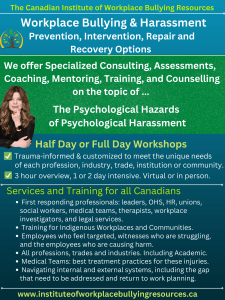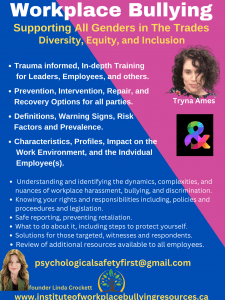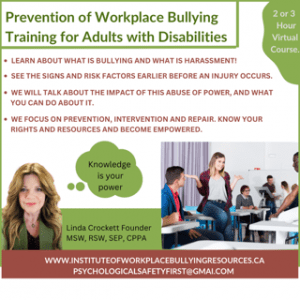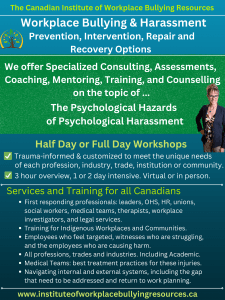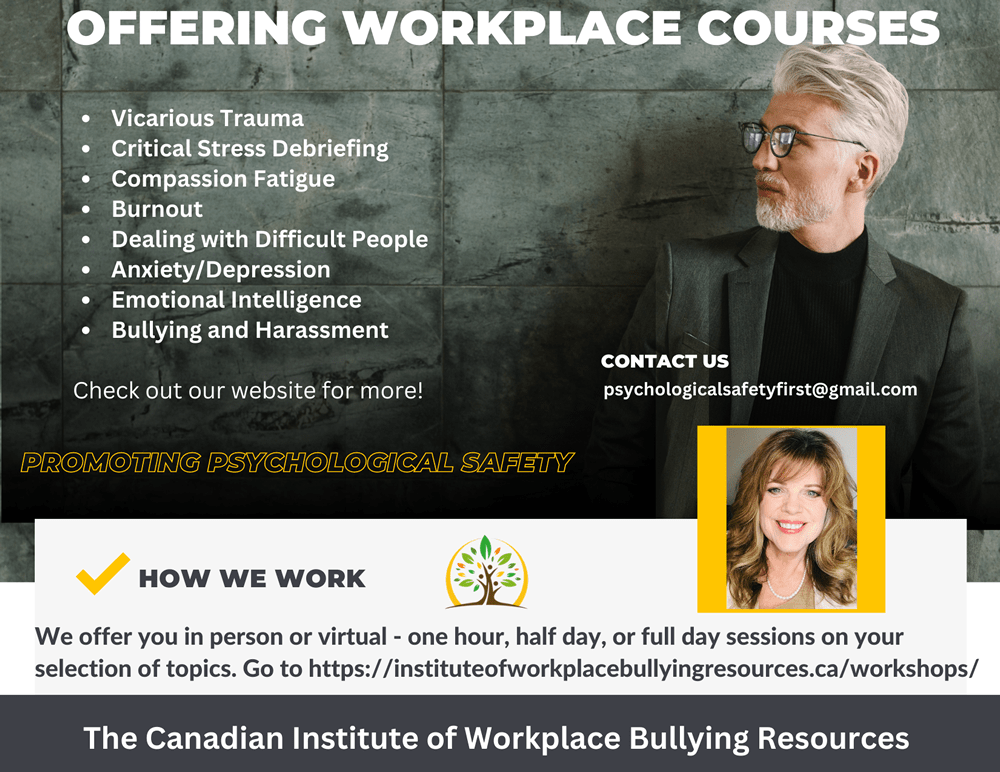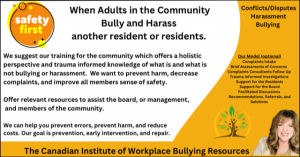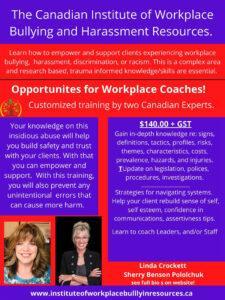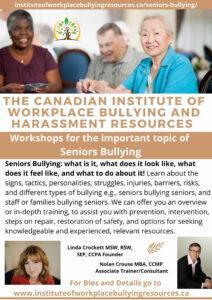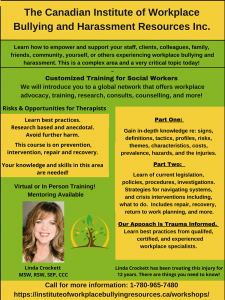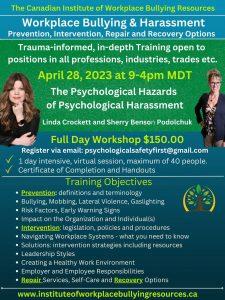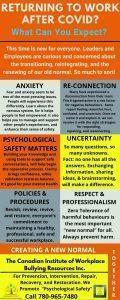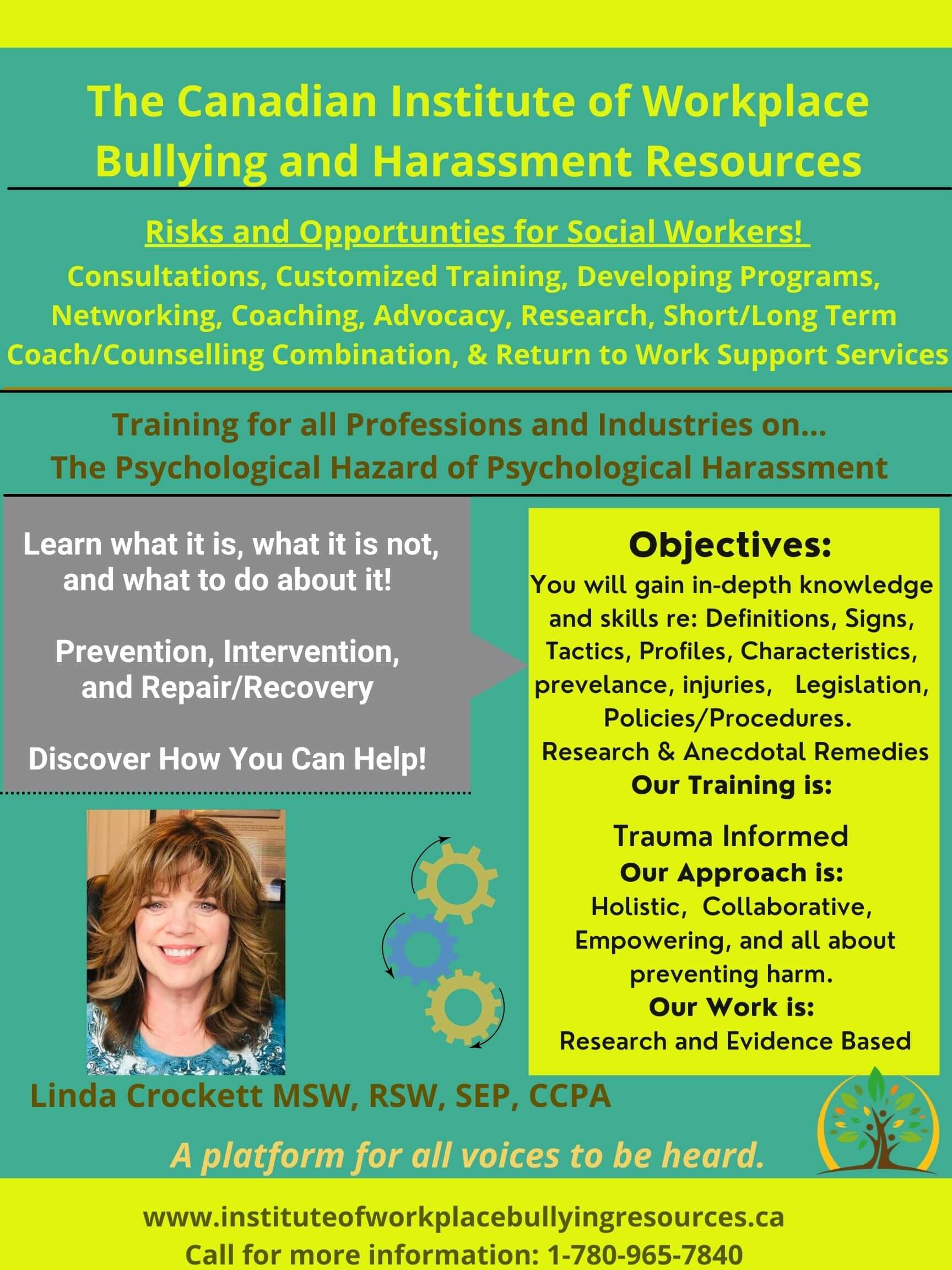Workshops
Workplace Bullying & Harassment Training
We offer services to support workplace management and normalize workplace psychological wellness.

3 Workshops for Bullied People
ANNOUNCEMENT: Two Pioneers. One Unmatched Offer. A Turning Point for North America.
Two of the original architects behind today’s #movement for #workplace hashtag#psychologicalsafety are joining forces. Their combined expertise is now available in one powerful offer, just when our countries need it most.
This is your opportunity to:
Spot#workplacebullying before it causes irreversible #harm
Address the #psychological and #physical #injuries already taking a toll
Reclaim your #health, #mentalhealth, your #dignity, and your #future
hashtag#Leaders, #employees, #targets #witnesses #HR #Safety #Unions #Insurance hashtag#Medical #Therapists #Counsellors #Coaches, and other allies—this is for you.
Half Day, Full Day, Two Day Workshops, Define and Address:
-
- What is and What is not Workplace Harassment: and what to do about it.
- Workplace Psychological Harassment, Psychological Violence, Bullying, Lateral Violence, Mobbing
- Psychological Health, Psychological Injuries, Hazards, Warning Signs, and How to Address them.
- In workshops we focus on: Prevention, Intervention and Resolution or Repair Strategies and Options
- Content includes policies, procedures, OHS Legislation, research, stories, and anecdotal examples.
- Training for Leadership and/or Training for Staff
- We encourage discussions, questions, and interactive activities
- Completion Certificates
For consistency of staff training: we offer a New Hire Orientation Package.
Workplace Bullying and Harassment Training for:
- Oil and Gas, Trades, or Construction Industries, or Multidisciplinary Professional Teams
- Social Workers: risks and opportunities
- Nurses: risks and opportunities
- Teachers: risks and opportunities
- Lateral Violence and Bullying in Indigenous Workplaces
- Domestic Violence Survivors. For those reentering or entering the workplace for the first time.
- Youth Entering the Workplace: understanding policy, rights, and resources available.
- Bullying Experienced by Seniors in Facilities. This training is for Staff, or Residents and Families.
Some Examples of Our Workshops
The Psychological Hazards of Psychological Harassment
with Linda Crockett
Full or Half Day Workshops
Workplace Bulllying
Supporting All Genders in the Trades
Diversity, Equity & Inclusion
with Linda Crockett & Tryna Ames
Workshops on Seniors Bullying
What is it, how to recognize it and what to do about it.
Workshops on Seniors Bullying
What is it, how to recognize it and what to do about it.
The Psychological Hazards of Psychological Harassment
Full or Half Day Workshops
in Calgary, southern Alberta & more
April 28, 2023
“We held several Mental Health sessions for our employees and Linda was fantastic! Her knowledge of the topics was vast, and she presented information that was both valuable and timely. Sharing both personal stories and established research to educate others, Linda made everyone feel at ease with her calm and empathetic manner.”
Sandra Moore
Project Advisor, W-T Centre for Mental Health Western Canada and Territories Region Service Canada / Government of Canada
“Linda Crockett’s facilitation style quickly puts the audience at ease and ensures that they are receptive to the content she has to offer. She facilitated a series of Mental Health sessions for our employees at ESDC/Service Canada in the Western Region. Our employees serve the public and deal with very high volumes of enquiries and help people who are in distress on a daily basis. We had over 1100 employees register for the 9 sessions. She spoke about Vicarious Trauma, Dealing with Difficult and Highly Activated people, Compassion Fatigue, Emotional Intelligence, Burnout, Depression and Anxiety. We had an overwhelmingly positive response to her sessions. Linda’s approach to mental health and wellness has helped influence our positive workplace culture and plant the seeds for further learning.”
Pam Cypher
Project Manager, W-T Centre for Mental Health
Western Canada and Territories Region
A Two-Day Training for Essential Skills for Treatment Professionals
Specialized training for Counselors and Therapists for treating targets of workplace harassment.
A Canadian study conducted in 2012 reported that 45% of Canadian workers reported experiencing harassment. One-third of harassed workers said it caused them health problems. It is now well known that workplace harassment or bullying is associated with a host of psychological problems ranging from distress to complex Post Traumatic Stress Disorder and suicide as well as serious physical problems such as gastric, muscular-skeletal problems, etc. Many who suffer serious impact from workplace harassment or violence are unable to work and many destroy their lives through severe rumination. Mental health treatment professionals have recognized harassment as a psychosocial stressor that can be difficult to treat. If a client comes early in the process of being harassed, support and standard treatment approaches are often effective. However, if a client has been bullied or harassed for a longer period of time and chooses to access help later and demonstrate moderate to severe symptoms, special considerations for treatment are required.
The Therapist Special Interest Group of the International Association on Workplace Bullying and Harassment (IAWBH) has been discussing diagnostic and treatment issues at the bi-annual conferences, special discussion days, correspondence and a summer school for over a decade. Many have published in top tier journals and written books Members include psychiatrists, psychologists, physicians, social workers, and other mental health professionals. Over the years this group has developed diagnostic framework and treatment protocol guidelines. This wisdom, their research, and clinical knowledge form the basis for this two-day training.
This is an opportunity to choose the focus of a one-day training session unique to all others. This provides incremental value in addressing workplace harassment. The impact would be significant to those attending in providing exposure to world-class speakers and for discussing the international experience and strategies.
The one-day training will:
- Assist mental health professions to understand what bullying and harassment involves, the causes, personal injuries, organizational damage, and possible consequences, as well as develop some understanding of what can be done for employers and employees.
- Provide a neurological, and psychological theoretical understanding as to why harassment is so harmful, even though the behaviours may be subtle and perceptions can vary.
- Discuss essential knowledge and skills for the therapist. This includes ethical considerations, transference, and boundary issues, self-awareness, review of the current state of research internationally, diagnostic frameworks, treatment options, goals of treatment, (for short- and long-term targets of harassment), aids to treatment, difficulties in therapy.
Participants will gain an understanding of:
- Range of definitions of harassment: legal, policy, research, popular
- Why workplace harassment is harmful and the neurological, genetic, biological, and psychological impact on a target.
- What the workplace can do to minimize and manage harassment or violence
- Philosophical and ethical foundation of human dignity
- How to set up an appointment, set boundaries and create safety
- Treatment strategies for mild, moderate and severe symptoms presentation
- Considerations for diagnosis
This workshop is co-facilitated with Pat Ferris MSW, RSW, M.Sc., Ph.D., my partner in creating respect at work.
Pat’s background includes working in-patient and community mental health for over a decade, then working in the Employee Assistance Program field for 25 years. Across these experiences, she has focused on the treatment of trauma as well as a general caseload. For the past 20 years, she has provided training to organizations on respectful workplaces and has treated those who have experienced sexual, racial, and other human rights protected violations of dignity. Pat has been treating targets of workplace bullying for 20 years. She presents internationally on bullying topics and publishes in top tier journals. She hosted the first IAWBH Summer School in Calgary in 2015. She has been the Co-convener of the Therapist SIG for the past 10 years. She is a partner in a large psychological practice.
Risks and Opportunities for Social Workers: Psychological Harassment (Bullying)
The Profession of Social Work is one of the most diverse professions. This is exactly what is needed to address harassment at all ages, a team with a variety of skills, perspectives, experiences, and tools. From assessments, investigations, consultations, training, research, activism, building awareness, to coaching and counselling, you are needed. As social workers you may be working with clients, helping friends or family members navigate workplace systems, or you may be experiencing workplace harassment yourself, and/or witnessing this occurring for others. You will need this knowledge personally (risks) and/or professionally (opportunities). Learn from the only two social workers in Canada with this level of expertise. Pat and Linda have worked with hundreds of organizations and thousands of individuals. They offer many webinars for you to learn from and they remain a strong resource for all social workers.
When negative interpersonal interactions such as harassment and violence occur in the workplace, some will become distressed and others will develop significant psychological injury that results in changes in behavior, workplace relationships, and culture. Injuries that develop can range from mild to traumatic requiring a trauma informed approach to restoration. Revitalizing a workplace after investigated and supported/unsupported incidents of workplace harassment and violence requires a phased team approach, in our experience. We recommend a phased approach to healing and repair for individuals, teams, and institutions.
The Canadian Institute of Workplace Harassment and Violence (CIWHV) offers all organizations, professions, and industries a specialized service to address negative, conflictual, and destructive employee behaviors and actions that give rise to psychological distress and harm to others. Founder Linda Crockett has relentlessly advocated for psychological safety in the workplace for many years. She is recognized as an international expert in this area speaking at conferences in Canada, USA, and Europe, and has successfully helped create positive changes for all working Albertans through research, advocacy, awareness building, activism, education, train the trainer, mentoring, mediating, facilitating discussions, investigating, coaching, through to short/long term counselling and trauma therapy.
This training begins with an overview of definitions (what is and what is not psychological harassment), prevalence, tactics, characteristics (common themes), causes and risk factors. Facilitators also review a variety of restorative, repair, and recovery options. Training also focuses on what to do when a client, family member, social worker, or colleague, experiences workplace harassment. Case examples, exercises, Q/A, and interesting discussions will be included along with a booklet of handouts.
Linda Crockett is an ongoing resource for all social workers.



